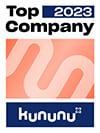10 B2B online store systems compared - the store guide

Are you active in the B2B business or planning to gain a foothold here? Depending on your product range, you will no longer be able to avoid creating an online store for your business customers. If you also have an offer for the B2C sector and already operate an online store there, it is worth thinking about creating another store just for your B2B buyers. After all, this is a completely different shopping experience than for private customers. Expectations and functions also need to be redefined. You can find out exactly what this looks like, which store systems are suitable for your own B2B store and much more here!
Reading time 14 min
- What exactly is a B2B online store anyway?
- Options for creating and operating a B2B store
- Our conclusion
- FAQ: All questions and answers about your B2B online shop
What is a B2B store?
A B2B store is a store that is aimed exclusively at business people. This means that companies, not private individuals, make purchases here. However, the products sold vary greatly. For example, it can be office supplies, but also materials that are used for further processing. B2B stores are generally operated as online stores and usually display the net price in addition to the gross price. VAT is refunded for business purchases if a VAT identification number is provided. However, there are other aspects that need to be taken into account when operating a B2B online store. You can find out more in the following sections.
What is the difference between a B2B store and a B2C store?
As already mentioned, the biggest difference between B2B and B2C lies in the target group. B2B or business-to-business means "from company to company". It therefore refers to the sale of products or services from one company to another. B2C or Business to Consumer means "from the company to the consumer". Here, services and goods are sold to private individuals, for example in the retail or catering sectors.
There are also business models that offer their products to both private individuals and companies. For example, it is common in the tourism industry to offer rooms not only to private vacationers, but also to business travelers who book hotel rooms through the company. Some hotels also have meeting rooms that can be used for company conferences or events.
B2B and B2C can also be distinguished from each other in smaller details. In the B2C sector, for example, the tone of voice is often a little more relaxed, as is the design of the online store. It is more about emotions and evoking a need for the products in the target group. Of course, business customers also need to be convinced, but on a completely different level. Here it is much more serious and facts take center stage. Many B2B companies have sales staff who look after customers and also use cold calling to sell goods or services to companies. A major difference between B2B and B2C can also be found on the legal side. Legislation is much stricter in the area of sales and advertising compared to private individuals. In addition, conditions between business persons can be set out in individual contracts. Private individuals have a statutory right of withdrawal.
Options for creating and operating a B2B store
If you want to operate a B2B store online, you can use so-called store systems. You can use these to create your store in just a few steps. In the following, we will select many store systems that are suitable for your B2B store. You will then find out how to start and complete the creation process.
Comparison of ten B2B online store softwares
Many store systems are primarily focused on selling to private individuals. However, additional requirements and setting options are necessary for selling to business customers. To help you find a store system for your B2B store that can fulfill these aspects, we have selected some suitable store systems for you. Find the perfect provider for your online store!
Shopware
Shopware is a tried-and-tested store system that primarily enables the creation of B2C online stores. However, there is also a B2B suite that focuses on business processes from the B2B sector.
| Shopware advantages | Shopware disadvantages |
|---|---|
- Costs: The B2B Suite is included in the Evolve and Beyond packages, price only available on request
- Setup: Simple
- Programming skills: No extensive knowledge required, but more customization is required
- Security: DSGVO-compliant
- For beginners to large corporations: For small and large stores due to individual prices
- Reports/analytics: Yes
- Marketing: Various options, including links to social media
- Design: Freely selectable with the help of themes
- Multilingualism: Yes
Shopify
Shopify is a Canadian company that offers the creation of online stores based on a SaaS model. According to the company, 1.7 million users use the store system to offer their goods on the Internet. Originally, Shopify primarily offered the opportunity to set up stores in the B2C sector. However, there are now a number of functions that make it easier to create stores in the B2B sector.
| Shopify advantages | Shopify disadvantages |
|---|---|
- Costs: Small packages starting at 29 dollars per month
- Setup: quick and easy
- Programming knowledge: Not required
- Security: Is provided
- For beginners to large corporations: Yes, small models up to Shopify Plus for large companies
- Reports/Analytics: Many reports on user behavior available
- Marketing: Yes, social media marketing, email marketing and SEO
- Design: Individual store themes
- Multilingualism: Yes
Adobe Commerce (Magento)
Adobe Commerce, formerly Magento, is a widely used store system which also provides B2B functions in the Enterprise version.
| Adobe Commerce (Magento) Advantages | Adobe Commerce (Magento) disadvantages |
|---|---|
- Costs: Prices only on request
- Setup: Difficult and time-consuming
- Programming skills: Necessary to set up and manage the store correctly
- Security: High security, automated data backups, disaster recovery and data storage
- For beginners to large corporations: Medium-sized companies
- Reports/Analytics: Extensive monitoring and alerts
- Marketing: There is an Adobe Marketing Cloud
- Design : Various templates available
- Multilingualism: Yes
Intershop
The German provider Intershop also has solutions for the B2B sector. Large companies and corporations in particular will find what they are looking for here, as Intershop meets the high demands of B2B business.
|
Intershop advantages |
Intershop disadvantages |
|---|---|
- Costs: Price on request (approximately five to six-figure license costs per year and scope)
- Setup: Difficult
- Programming skills: Helpful
- Security: High
- For beginners to large corporations: Rather for medium-sized to large companies and organizations
- Reports/Analytics: Analytics of purchasing behavior, checkout behavior, product performance, sales performance, customer segments, also with the help of Google Analytics
- Marketing: Many marketing and sales functionalities
- Design: Various design options
- Multilingualism: Internationalization is possible
Salesforce Commerce Cloud
With the B2B Commerce Cloud, Salesforce is also launching a solution for business-to-business business.
| Salesforce Commerce Cloud advantages | Salesforce Commerce Cloud disadvantages |
|---|---|
- Costs: High, on request
- Setup: Setup is quite simple, as there are online instructions
- Programming knowledge: not absolutely necessary
- Security: Customer data can be easily protected with Salesforce
- For beginners to large corporations: More suitable for larger companies due to costs and complexity
- Reports/analytics: B2B commerce analytics are available
- Marketing: Purchase recommendations, advertising banners and personalization
- Design : Can be personalized
- Multilingualism : Many languages can be selected
Spryker
Spryker is an e-commerce system that specializes in large online retail customers. Spryker can be used for B2B and B2C commerce, but also for unified commerce as well as first and third party marketplaces. You can also integrate third-party systems with Spryker.
| Spryker advantages | Spryker disadvantages |
|---|---|
- Costs: Price on request
- Setup: Difficult without a service provider
- Programming knowledge: Helpful to necessary
- Security: Yes
- For beginners to large corporations: Spryker is aimed more at larger companies and corporations
- Reports/Analytics: Yes
- Marketing: Discounts, promotions, recommendations and personalization
- Design: Various themes
- Multilingualism : Support for multiple languages
commercetools
Commercetools is a store system for small businesses to large corporations. It is a cloud-based headless commerce platform that can also be used in the B2B sector. The company has been around since 2006.
| commercetools advantages | commercetools disadvantages |
|---|---|
- Costs: On request, 60-day free trial
- Setup: Simple, as cloud solution. But changes can also be made in the web interface if necessary
- Programming knowledge: Not required
- Security: High network and platform security, secured by WPA2 encryption and AES 256-bit keys
- For beginners to large corporations: Yes, but mainly medium-sized to large companies
- Reports/analytics: activity dashboard and tracking, statistics, real-time data
- Marketing: Promotions, discounts, recommendations, personalization, social channels
- Design: Various design options to create an intuitive webshop
- Multilingualism: Multiple currencies and multilingual setup
plentymarkets
Plentymarkets from Plentysystems AG is suitable for various industries and business models, including the B2B sector. Every company will find what they are looking for in the Basic to Enterprise tariffs. Additional B2B-specific functions can be integrated into the online store via the B2B store plugin, which can be installed via plentyMarketplace
| plentymarkets advantages | plentymarkets disadvantages |
|---|---|
- Costs: 5 different packages, starter package Basic is available from €42/month plus order-dependent fees, the B2B plugin can be used in the subscription model for €290 per year
- Setup : Time-consuming
- Programming knowledge: Not necessary
- Security: A top priority, IDW PS 880 certification of the entire system, data is traceable for up to ten years and tax documents are backed up
- For beginners to large corporations: For small and large companies. However, setup is time-consuming, which is why this means a lot of resources for small companies that may not be available
- Reports/analytics: various plugins can be installed for reports and analytics
- Marketing: good measures to implement SEO
- Design : Is customizable
- Multilingualism: Multiple languages and currencies
SAP Commerce Cloud
Small, medium-sized and large companies can create their own B2B store with the help of SAP Commerce Cloud. This is because the SAP Commerce Cloud for B2B is an integrated, modular and expandable store solution.
| SAP Commerce Cloud advantages | SAP Commerce Cloud disadvantages |
|---|---|
- Costs: Prices on request, Standard and Professional Edition packages
- Setup: Implementation is quick if SAP base systems are already in place
- Programming knowledge: Not necessary
- Security: Access rights management, backup concept
- For beginners to large corporations: Mainly for large companies
- Reports/analytics: Dashboards with analytics
- Marketing: Promotions, discounts, product recommendations and personalization
- Design: Personalization of the online store possible
- Multilingualism: Yes, different languages and currencies
OXID eShop
The online store software OXID eShop is a store solution from the German company OXID eSales AG, which is based in Freiburg. They offer various editions that are suitable for both small and large companies. The Enterprise Edition is optimized for the B2C and B2B market.
| OXID eShop advantages | OXID eShop disadvantages |
|---|---|
- Costs: Price on request
- Setup: Set-up is simple
- Programming knowledge: Can be used without programming knowledge
- Security : Security updates are carried out regularly
- For beginners to large corporations: For beginners and large enterprises
- Reports/Analytics: Google Analytics can be integrated, for example
- Marketing: Extensions for online marketing tools available, SEO possible
- Design: Various modules and themes are available
- Multilingualism: Internationalization possible
Our conclusion
The choice of store systems for your B2B store is huge. It's difficult to say which store system is best for you. It all depends on what goals you are pursuing, how much budget you have available and how complex you want your store to be. Spryker and the Salesforce Commerce Cloud, for example, are more suitable for large companies. The Shopware store system can be the right solution for both small and large companies. If you are not yet sure which store system is the best choice for you and your company to set up a B2B store, we will be happy to help you. Thanks to years of experience in e-commerce, we know how to set up successful online stores and know what your company needs.
FAQ: Questions and answers about the B2B online shop
If you still have questions about the B2B store, you can find a few frequently asked questions and the corresponding answers and explanations here. Do you still have a specific question or need help with your B2B online store? Then don't hesitate to contact us. We are here to help and advise you with your digital projects.
-
Why should you run a B2B store?
If you are active in the B2B sector, it is almost always worth running an online store. Especially if you offer products or services for both B2B and B2C business, it's worth running these areas separately. This is because the target groups differ significantly from one another. Most B2B buyers are already familiar with your products or at least require completely different advice. The total amount of purchases is also often much higher, which is why you should adapt your products and stock directly to the target group.
-
What B2B online store software is available?
If you want to create an online store for your B2B business, it makes sense to use a suitable store system. There is a large selection of software with similar, but sometimes also very different tariffs. You can choose from these online store softwares, among others:
-
How can companies ensure that their B2B online stores are in line with the latest trends and technologies?
B2B online stores are essential today to stay competitive and meet customer needs. To ensure that their B2B online stores are up to date, companies should follow some best practices. Regularly updating the B2B online store is important to ensure it utilizes the latest technologies and trends. Companies can also use e-commerce platforms to ensure that their B2B online stores are constantly updated and offer the latest features and technologies. Implementing Artificial Intelligence (AI) and automation technologies can help companies automate their business processes and improve efficiency.
-
What types of products or services are best suited for selling through a B2B online store?
Customers often look for specific information in B2B online stores, such as product specifications, prices, availability and delivery time. Companies should therefore ensure that this information is easily accessible and easy to find. A well-designed B2B online store should also have simple navigation and a user-friendly interface to make it easy for customers to find what they are looking for. In addition, companies should ensure that their B2B online stores have a powerful search function that allows customers to search for products or information quickly and easily. A clear and detailed product description as well as high-quality product images are also important aspects to give customers an accurate picture of the product and facilitate their purchase decision. Companies should also offer the opportunity to compare products and read reviews from other customers to increase confidence in the product and the company.
Was ist dein Projekt? Wenn du uns darüber erzählen möchtest, rufen wir dich zurück!

Hello, my name is Meike. I take care of the EXWE back office and am responsible for our social media channels. All of our articles are meant to make your life easier and help you make decisions. Nevertheless, it can happen that something remains unclear, so: If you have questions about this article you can easily reach me at +49 231 93149827.
A website relaunch is coming up and you're worried about your Google ranking? Here you can find out everything about the perfect website relaunch without SEO mistakes!
Here are ten good PayPal alternatives for your online store: Easy-to-integrate payment methods for fast payment processing for your customers.
More success in e-commerce with the Shopify interface - Find out everything you need to know about the integration here









